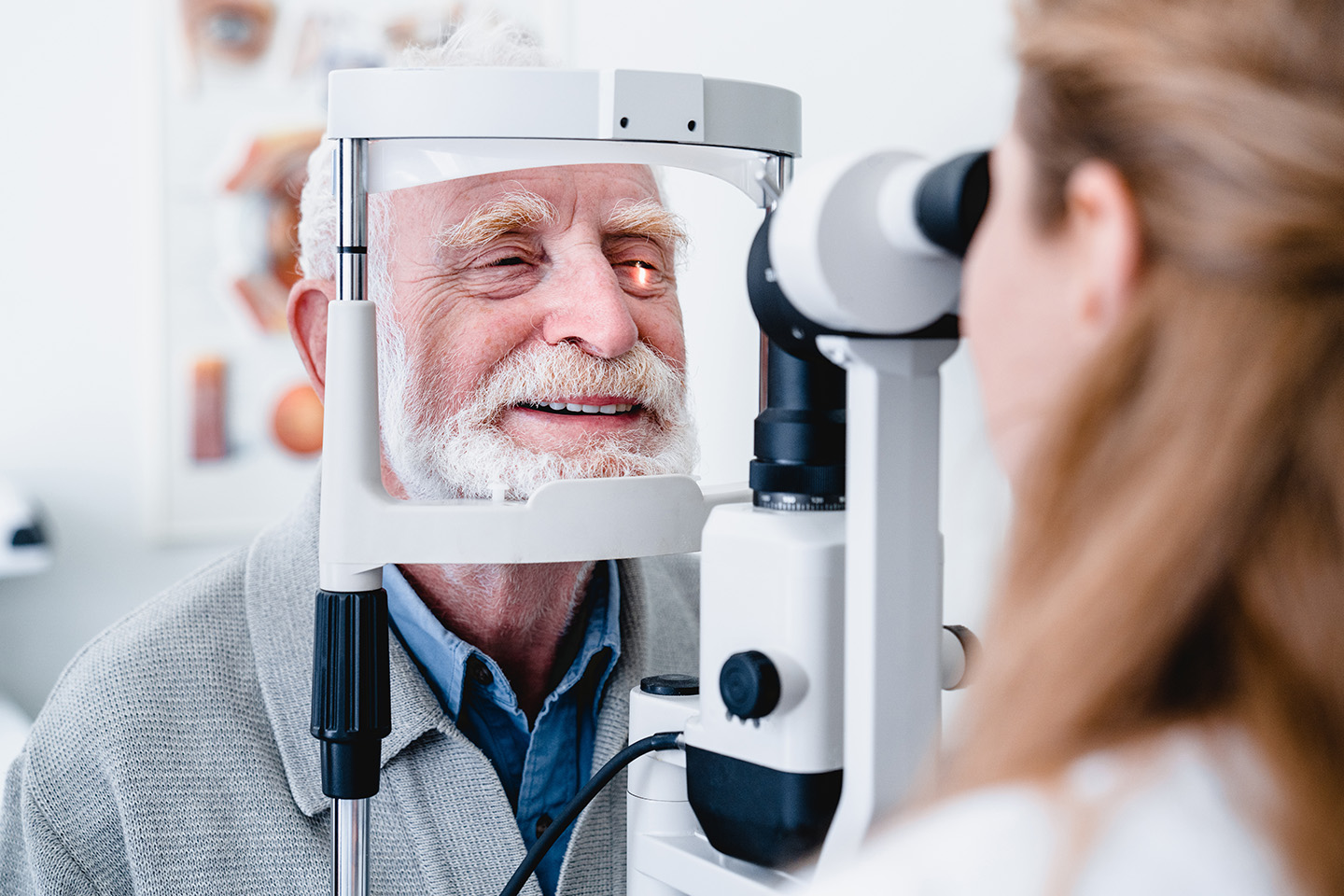Cataracts are a natural part of aging and are most often noticed with the onset of blurred vision or loss of color vibrancy due to the cloudy lens. They can affect one or both eyes and make tasks like nighttime driving or reading small print difficult. Over time, the cloudiness worsens, which is why it’s important to understand what’s happening and what your options are.
Cataracts can be managed in the early stages with corrective lenses, but will continue to advance. Blurry vision may become more noticeable as the cataract grows and covers a more significant portion of the lens, and you may become more sensitive to light. You may also experience more frequent changes to your prescription lenses.
Eventually, cataracts will lead to complete vision loss if left untreated. Cataract surgery is the only way to remove the cataract, restore your vision with an artificial intraocular lens (IOL), and regain your confidence and quality of life.
Early diagnosis and timely treatment are key to preserving your vision and avoiding preventable vision loss.

At Swagel Wootton Eye Institute, we pride ourselves on offering patients options to support their lifestyle, budget, and vision goals. Our specialists are skilled in the latest technologies and techniques, including femtosecond laser-assisted cataract surgery using the LenSx® Cataract Laser. This computer-assisted technology is renowned for its proven precision, efficiency, and safety. The surgeon uses this laser to make the corneal incision and its ultrasonic waves to break up the cataract before removing the fragments and implanting the artificial lens. Once the IOL is inserted, the ORA System™’s intraoperative aberrometry allows us to make microscopic, real-time adjustments to refine your results.

All artificial lenses correct cloudy vision for cataract patients, but the best lens for you depends on your lifestyle, vision needs, goals, and budget.
For many patients, advanced technology IOLs provide a seamless solution to daily hardships. They can eliminate the need to manage overlapping vision conditions, provide relief from juggling multiple pairs of glasses, and deliver clear vision that often exceeds expectations. Ultimately, choosing your IOL is more than an investment in your vision; it’s an investment in your overall health, independence, and quality of life.

Select the statement below that best describes you and what you want from your cataract surgery learn more about the lens options Swagel Wootton Eye Institute offers to help you reach your goals.

Individuals who don’t mind wearing glasses or who see their eyeglasses as a reflection of their personality may be happy with a standard monofocal lens. Most patients with this lens choose to correct distance vision to support activities like driving, but will typically need eyeglasses for tasks that require near and even mid-range vision, such as reading, crocheting, automotive work, or viewing phone screens.
Sports and outdoor enthusiasts, or active individuals who simply want to wake up and be free of eyeglasses, may prefer to choose an advanced technology multifocal lens that allows them to see clearly at all distances. That means seeing sharper images and brighter colors for activities and hobbies like driving, working at a computer, playing golf, sightseeing while traveling, or scuba diving.
Patients who experience blurry vision because of astigmatism may choose an advanced technology toric lens, which improves distance vision for watching movies, identifying street signs, or playing sports like pickleball. Some individuals may require readers to see clearly for close-up tasks, depending on the type of toric lens they choose.
Individuals who want to take control of their vision and achieve the most precise outcomes may find the advanced technology light-adjustable lens to be the best choice for them. This premium lens is also often ideal for individuals who have previously had refractive surgery, such as LASIK, or have irregular corneas or astigmatism. While additional appointments will be needed after cataract surgery, this lens allows patients to further customize their results and offers a higher likelihood of achieving 20/20 vision, reducing the need for glasses.
Once you have decided on cataract surgery from Swagel Wootton Eye Institute, our experienced team will guide you through our surgery technique (traditional or laser-assisted) and lens package options. Our packages include:
Includes a standard monofocal lens to provide clear vision at one set distance.
An advanced computer-guided femtosecond laser system offers more precise corneal incisions, real-time customizations, and faster recovery. This package can also treat low levels of astigmatism by creating micro-incisions to reshape the cornea. This allows patients to see items at a distance more clearly without toric lenses and often without glasses.
Helps correct blurred or distorted distance vision caused by astigmatism using a special toric lens. Some patients — particularly those with low levels of astigmatism — may choose monovision, where one eye is corrected for distance vision and the other for near vision. This allows clear vision both up close and far away with less reliance on glasses. There is an adjustment period with monovision, and it can affect depth perception.
*This is an advanced technology package and includes laser-assisted cataract surgery.
Uses advanced multifocal lenses to reduce dependence on glasses at all distances — far, intermediate, and near.
*This is an advanced technology package and includes laser-assisted cataract surgery.
Features the most advanced technology with the RxSight LAL to help patients design their visual outcomes and achieve optimized results.
*This is an advanced technology package and includes laser-assisted cataract surgery.

Cataract surgery is one of the most common surgeries worldwide, with more than 3.5 million performed annually in the U.S. It’s typically an outpatient procedure, meaning there is no need for an overnight stay. While patients should expect to be at the facility for around 2 ½ hours, the procedure generally takes less than 20 minutes.
At Swagel Wootton Eye Institute, our expert team of cataract surgeons delivers the highest-quality, most customized treatments possible.

“At 77, I have the best vision of my life.”





“This is more than I could have ever imagined. The clarity, the crispness — it’s like you can almost hear better because you can see better.”





“I was so nervous to have my cataract surgery for both eyes. Dr. Ramsey and her team were great and certainly made me feel at ease throughout both procedures. It's a wonderful feeling to have restored vision. Everything is so vivid!”





Recovery time is normally minimal, with some patients reporting improved vision within just a few hours of surgery. Usually, you can expect to have clear vision restored after about a week as your eye heals and adjusts to the new lens. Each patient’s recovery time differs, but full recovery generally takes approximately four weeks. Temporary side effects, including blurry vision, light sensitivity, bloodshot eyes, or a scratchy sensation in your eyes, are common and should subside within the following days. At Swagel Wootton Eye Institute, we schedule a post-operative visit in the first few days following your surgery to ensure healing is advancing as expected and there are no complications.
Best Practices for Recovery
|
What to Avoid
|
At Swagel Wootton Eye Institute, we’re committed to delivering safe, personalized care and exceptional outcomes. As an ophthalmology practice rooted in surgical and medical services, we place the care of our patients first. With over 60 years of experience and two convenient locations across the greater Phoenix area, our renowned cataract surgeons have performed thousands of procedures. Trust our team to help you see your world with confidence.

Every Swagel Wootton surgeon meets the highest standards in training, safety, and outcomes. United by a shared philosophy, our team takes the time to understand your goals, match you with the right technology, and deliver results that improve your vision and your life.
A cataract is the clouding of your eye’s natural lens. The lens consists of proteins, called crystallins, and water. It focuses light to create a clear, crisp image on the retina. Over time, the proteins break down and group together, clouding the lens and forming a cataract.
Most eye surgeons recommend cataract surgery when patients experience vision impairment to the extent that it negatively impacts their quality of life, such as limiting their ability to perform daily tasks confidently or safely, causing increased feelings of depression or anxiety, or leading to social withdrawal or isolation — effects which have all been linked to vision loss. However, some patients may elect to have surgery in earlier cataract stages before symptoms become so advanced. Cataract surgery candidates must be in general good health and have no other severe eye conditions that could compromise the surgery and outcomes, such as glaucoma or macular degeneration. Ultimately, every patient is unique and should discuss their available options with their ophthalmologist.
During your cataract evaluation, you’ll receive preoperative instructions. Discuss any medications you currently take; you may be asked to stop taking or modify your medicines before the surgery to prevent complications. Use antibiotic and anti-inflammatory eye drops as directed to help prepare the eye and promote safe and effective healing.
You may also be asked to avoid eating or drinking for 6-8 hours before the procedure.
Traditional cataract surgery (or small incision cataract surgery) and laser-assisted cataract surgery are the two primary types. While they are both safe and effective and promote clear vision, they differ in the tools and techniques used to make the corneal incision and break up the cataract.
In traditional cataract surgery, the eye surgeon makes the corneal incision with a small scalpel. They use a small ultrasonic tool called a phaco probe to break up (emulsify) the clouded lens.
In laser cataract surgery, the surgeon uses a femtosecond laser to make the incision, then uses the laser’s energy, rather than the phaco probe, to break up the cataract.
Both techniques are safe and effective and deliver proven results. However, laser cataract surgery offers enhanced precision, efficiency, and vision results.
This method involves making a larger incision in the cornea and removing the lens in one piece. It may require sutures and a longer recovery time. We may recommend extracapsular cataract surgery in certain limited situations when phacoemulsification is not possible, typically with advanced cataracts where the clouded lens may be too dense to break up.
Typically no. The corneal incision usually heals without the need for sutures.
Rest assured, most patients do not experience pain. It’s normal to feel slight pressure or mild discomfort during cataract surgery, and some patients may have mild discomfort or irritation after surgery when the numbing eye drops wear off.
Rest is important to help facilitate recovery, and you should take it easy for two or three days after surgery before resuming normal activities. This may require taking a few days off work or limiting social or housework plans.
Cataract surgery is proven to be safe and effective, but as with any surgical procedure, there are some risks. However, complications are rare and generally very treatable. Potential complications include elevated eye pressure, inflammation, infection, and swelling. One of the most serious complications is retinal detachment, which requires immediate attention.
Patients with previous eye trauma, retinal surgery, or other eye structure anomalies have more risk of complications than those without.
No. The artificial lens prevents the future development of cataracts.
Yes, patients who have had LASIK surgery can also have successful cataract surgery. However, informing your cataract surgeon about your prior LASIK procedure is important, as it may affect how your doctor treats your cataracts and your IOL selection.
The period between cataract removal procedures can vary based on different factors, such as surgical technique and the patient’s overall health (including age, preexisting health conditions, and the ability to heal and follow postoperative care instructions).
At Swagel Wootton Eye Institute, we provide a seamless experience by planning both eye surgeries simultaneously and will schedule them between one and three weeks apart to ensure safety and quality outcomes.
At Swagel Wootton Eye Institute, out-of-pocket costs for cataract surgery can vary depending on surgery technique and IOL selection. Health insurance plans, including Medicare, Medicaid, and private plans (such as Affordable Care Act-compliant plans found on a health insurance marketplace), typically cover at least part of cataract surgery costs.
Our patient care team can confirm if we accept your insurance and review your benefits to provide a more accurate estimate for your selected surgery technique and IOL. However, we encourage you to contact your insurance company with any specific benefit or coverage questions.
Yes. At Swagel Wootton Eye Institute, we want to give every patient the opportunity to have optimal vision and an improved quality of life. We offer flexible payment plans and interest-free financing through Alphaeon Credit and CareCredit. You may qualify for 0% interest for up to 24 months with no money down with approved credit, as well as extended payment options for up to five years. Your surgical counselor can help answer any questions and assist you with completing the application process at your consultation.
You can also use funds from health savings accounts (HSAs) and flexible spending accounts (FSAs) to pay for all or part of your cataract surgery.



